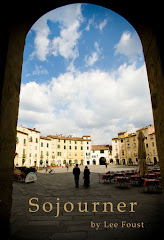Forests of slender
trees, spaced at polite distances one from the other, wave at our passing
automobile. “Since our forests are so well behaved, we Romanians feel free to
go a little mad sometimes,” Ela tells me. Forbidden visual impression: look but
don’t record. “No photos!” I’m admonished by a truck stop warden. Memory is an
objective lie. Even anonymous prefers to be seen but not photographically
recalled. Rosé is a poor compromise anyway you look at it. I’m not
surprised—after all, the radical always hides in plain sight.
The rules usually break me so I
blush to be thus censured.
My writing remains neutral in the
war on the passive voice—for we’re awfully fond of empathy, all Voivode aside.
There’s nothing quite like food in a paper sack as my own bones are woven of
plant fiber, fish flesh, and stringy cat gut from the bottom of a snare drum.
Culture is the camouflage I put on in order to circumvent the brutes.
Wallachia’s mirror: the Turks. All mustaches are created equal. But our poets
are bigger than your poets. Genocide’s only a part participle of national
pride—usually in the third person plural. Sad in the homeland is only a backward
way of saying nomad, (happyyes?); just another asshole, just another hominid in
a dormitory of non-denominational dreaming. (He moved to Zurich—where else?)
La
dracu Tzara and his Dada, saying yes to everything twice. Bucharest should
be the capital of Europe, so big and tactile are its endless cement precipices.
Everything west of Wallachia has already been killed with kindness anyway.
“If Vlad Tepes heard you say that he’d
tell you to go impale yourself,” says Ela with aplomb.
We climbed the Carpathians then,
past his citadel (the Dracula Campground at its feet, impaled dummies up the
steep slope for dramatic effect) to the glacier lake with its monkish tonsure
of hairy October snow. But even here we can’t escape the barbarians nursed at
our corporate teat all these years. I thank God for making Communists, so that there
will be someone around to miss capitalism when it’s finally killed all of its
practitioners. (I also thank God for making me an atheist—my mother only made
me a sweater.) I’ve watched ‘em, worshippers of Moloch, these many years, throwing
their lives at the feet of Telecom in supplication. He’s harsher than any
heart-rending Incan virgin-eating deity. For the cellphone has finally found a
way to coerce the bourgeoisie into choosing slavery over nothing.
This
is why capitalism always wins: unlike humorlessly ethical and logical
communism, it incorporates Dada into its barcode, never takes itself all that seriously
(not even during its many genocidal binges), and lets its followers believe in
advertising so that they can die desiring all the wars their little hands can
muster—so many of them are dying to be martyred for their school, their boss,
their country, and/or their god. (A word that can only be written between
air-quotes these days.)
Art, it appears from the
glacier-lakeside at the top of the snow-dotted Carpathian Mountains on October
20th, 2017, has proven itself impervious to either promoting or
destroying capitalism. Although it’s a rather uneasy truce—and one that gives
art, like Switzerland, a bad name. It takes a real audience of slaves aware of
the fact that they are slaves to be moved by images of resistance. Humor always
escapes the belongers, parishioners, capitalists, and automobile ‘n’ cellphone
enthusiasts.
The bullfighter stands alone against
history (in a somewhat warmer country southwest of here), brutally murdering
his only friend again and again for reasons so buried in history, machismo, and
the desire for self-annihilation that he refuses to even consider them.
The artist sits for the model who,
not being made of paint, gets bored and goes out for a smoke. Dada, on the
other hand, gets things done these days—since the rest of the world has fallen
into a period of argumentative languishing. The artist fails to sell anything by
selling out, puts his or her soul on sale, and ends up slinging hash—leaving a
pile of vile bodies outside in a heap.
I wonder how our boy Tzara crossed
the Carpathians back in his day on his way to Zurich and ridiculous history. In
a caravan? The covered wagon my family must have once taken from Ohio to Iowa.
To end up in Hayward, California in a Model A—being wayward becomes a way of
life once you take to the latcho drom.
Some places are better to be from than to end up in.
“The road down the other side of the
mountains was built by prisoners,” Ela tells us. “It’s one of the most
beautiful and famous roads in the world. It’s paved with their blood.”
(Somewhere beyond its foot lies Dracula’s castle.)








No comments:
Post a Comment